Volunteer tourism can benefit local communities and promote personal growth through cultural exchange and skill-building. It encourages sustainable practices and empowers residents, fostering resilience. However, it also faces criticisms like creating dependency, risking cultural commodification, and sometimes doing more harm than good if projects lack long-term planning or community involvement. To make a meaningful and ethical impact, it’s important to contemplate these benefits and challenges carefully. Keep exploring to understand how to navigate this complex field responsibly.
Key Takeaways
- Volunteer tourism can boost community development and personal growth, but may also cause dependency and undermine local autonomy.
- Ethical concerns include potential exploitation, cultural insensitivity, and superficial engagement that lack long-term benefits.
- Benefits include fostering cross-cultural understanding, empowerment, and sustainable practices within communities.
- Criticisms focus on short-term impacts, cultural commodification, volunteer burnout, and risks of disrupting local systems.
- Responsible planning and community-led initiatives are essential to maximize positive impacts and minimize negative effects.
Understanding Volunteer Tourism

Volunteer tourism, often called “voluntourism,” combines travel with short-term volunteering efforts, allowing you to contribute to community projects while exploring new places. As you get involved, you might face ethical dilemmas about whether your presence truly benefits the community or unintentionally causes harm. Many volunteers are motivated by a desire to help and make a difference, but these motivations can sometimes conflict with the actual needs of the community. Understanding volunteer tourism means recognizing that your intentions matter, yet actions must be carefully considered to avoid exploitation or dependency. It’s essential to reflect on your volunteer motivations and ensure your efforts align with the community’s best interests, rather than just personal fulfillment or adventure. Additionally, being aware of ethical considerations can help ensure your volunteer efforts are genuinely beneficial and respectful of local communities. Moreover, understanding the impact of affiliate marketing disclosures and privacy policies can help volunteers navigate online resources responsibly while planning their trips. Recognizing the importance of cultural sensitivity is vital to prevent unintentional disrespect or cultural insensitivity during your volunteer work. Staying informed about AI developments can also help volunteers leverage innovative tools to document and share their experiences more effectively and ethically through various digital platforms.
The Advantages of Participating in Volunteer Projects

Participating in volunteer projects can markedly improve local communities by addressing their specific needs. It also offers you opportunities for personal growth, teaching new skills and broadening your perspective. By getting involved, you make a lasting impact while enriching your own life. Additionally, engaging in such projects can enhance your understanding of community development, fostering a greater sense of empathy and responsibility.
Community Impact Enhancement
Have you ever wondered how engaging in volunteer projects can truly benefit communities? Your participation fosters local empowerment, giving residents the tools and confidence to address their own needs. It also strengthens community resilience, creating a network that can better withstand challenges. Imagine this impact visually:
| Community Members | Resources & Skills | Long-Term Growth |
|---|---|---|
| Empowered locals | Improved infrastructure | Sustainable progress |
| Trained volunteers | Better education | Self-sufficient communities |
| Collaborative efforts | Enhanced health | Ongoing development |
Furthermore, involving volunteers can improve community engagement in community initiatives by promoting diverse and inclusive participation, ensuring that a variety of perspectives are represented in development efforts. This approach not only enriches project outcomes but also ensures that initiatives are more responsive to the community’s needs, fostering a sense of ownership and commitment among residents. Additionally, integrating sustainable practices into volunteer projects can lead to more environmentally conscious and long-lasting impacts.
Research indicates that personal growth through volunteer work can enhance individual well-being and motivation, ultimately benefiting community development efforts.
Personal Growth Opportunities
Ever wondered how stepping outside your comfort zone can lead to personal growth? Participating in volunteer projects pushes you to face new challenges, helping you develop valuable skills and build confidence. Through hands-on work, you’ll gain real-world experience that enhances your skill development, whether it’s leadership, communication, or problem-solving. These projects often require adaptability and resilience, fostering a deeper understanding of yourself and others. As you navigate unfamiliar environments, you’ll learn to manage uncertainty and develop a proactive mindset. Personal growth occurs when you see your progress firsthand, boosting your self-esteem and openness to new experiences. Volunteering not only benefits communities but also transforms you into a more capable, empathetic individual prepared for future opportunities. Additionally, understanding the different cookie categories helps ensure your online privacy is maintained while you engage in such enriching activities. Being aware of cost and budgeting considerations when planning your volunteer trip can help you better manage expenses and avoid unforeseen financial challenges. For example, selecting appropriate power sources, like portable batteries or solar panels, can ensure your devices stay charged during remote volunteering efforts. Moreover, choosing the right no-sugar-added juice brands can help maintain your health and hydration during your travels, supporting your overall well-being.
How Volunteer Tourism Promotes Cultural Exchange

Volunteer tourism fosters cultural exchange by immersing travelers in local traditions, customs, and daily life. As you engage with community members, you gain firsthand insight into their way of life, which deepens your intercultural understanding. This direct interaction helps break down stereotypes and biases, allowing you to see beyond surface differences. Participating in local festivals, sharing meals, or learning traditional skills creates meaningful connections that promote mutual respect. Your active involvement encourages a two-way exchange, where both you and the community benefit from shared knowledge and experiences. Engaging in electric dirt bike activities can also introduce you to sustainable transportation options that benefit local environments. Developing Cultural Intelligence (CQ) is essential for navigating these intercultural interactions successfully. Through this process, your perspective broadens, fostering greater empathy and appreciation for diverse cultures. Additionally, understanding different cookie categories can help you make informed decisions about online privacy while engaging in these cultural exchanges. Recognizing the importance of cultural sensitivity can further enhance respectful and effective interactions. Moreover, employing various home decor elements thoughtfully can create welcoming environments that reflect cultural appreciation. Ultimately, volunteer tourism not only contributes to local communities but also enriches your own cultural awareness.
Supporting Local Development and Infrastructure
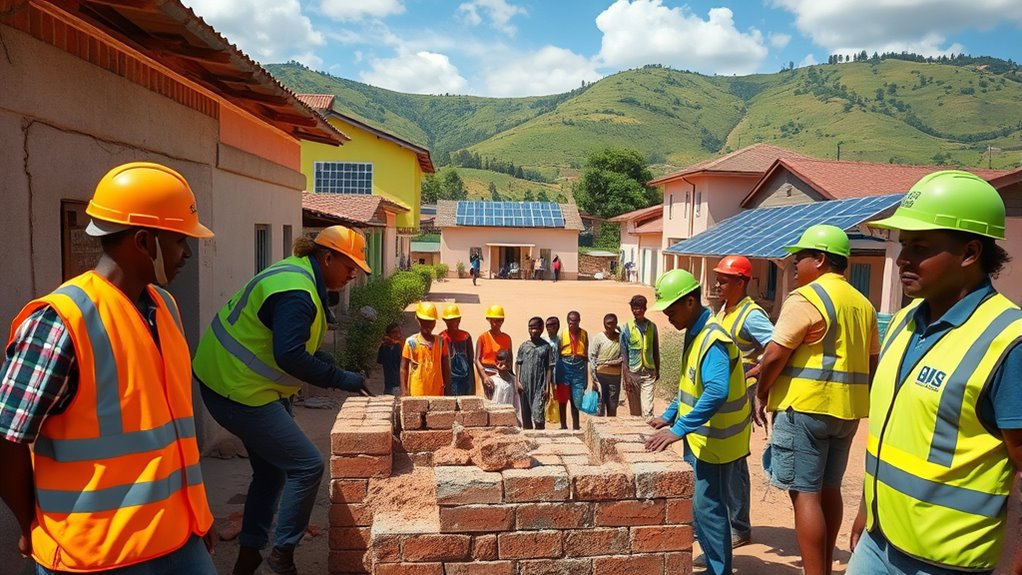
Supporting local development and infrastructure is a crucial way volunteer tourism creates lasting benefits for communities. When you contribute, you help improve local infrastructure like roads, schools, and healthcare facilities, fostering community development. Your efforts can lead to better access to essential services, boosting residents’ quality of life. It’s important to focus on sustainable projects that empower communities rather than create dependency. Here’s a quick comparison:
| Positive Impact | Potential Risks |
|---|---|
| Strengthens local infrastructure | Risk of creating unsustainable projects |
| Enhances community development | Potential for dependency on volunteers |
| Promotes long-term growth | Short-term focus may overlook local needs |
Challenges and Criticisms of Volunteer Tourism
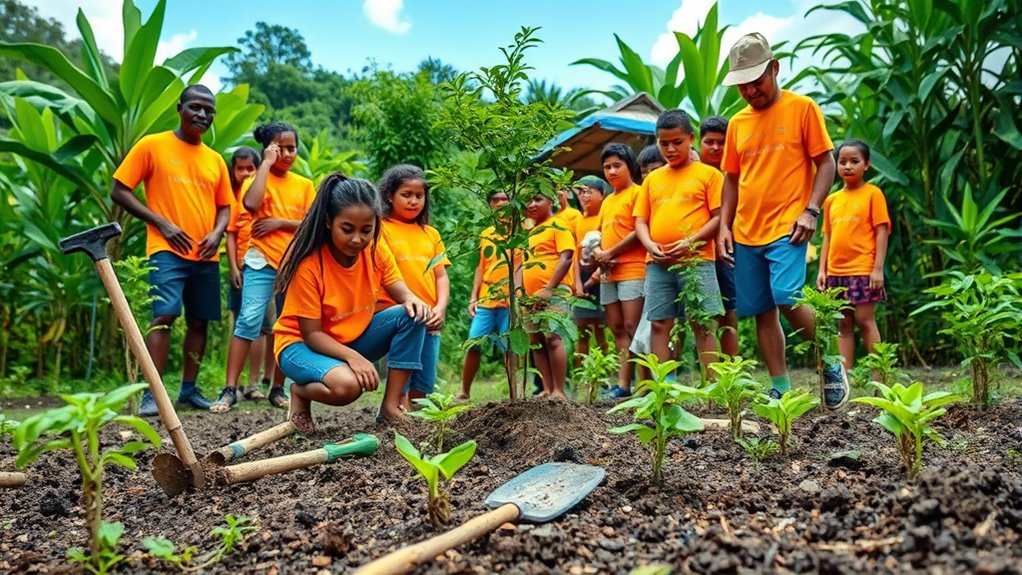
While volunteer tourism can bring tangible benefits to local communities, it also faces significant challenges and criticisms. One major concern is cultural commodification, where local traditions are turned into attractions for tourists, risking loss of authenticity. You might also encounter volunteer fatigue, as volunteers often face burnout from repetitive tasks or unrealistic expectations. Additionally, some programs inadvertently promote dependency rather than empowerment, creating long-term issues. These challenges highlight that volunteer tourism isn’t always beneficial without careful planning. You should consider how cultural practices are preserved and whether volunteers are genuinely contributing meaningfully. Recognizing these criticisms helps ensure that volunteer tourism evolves into a responsible and respectful practice that benefits both communities and volunteers alike.
Concerns About Dependency and Sustainability
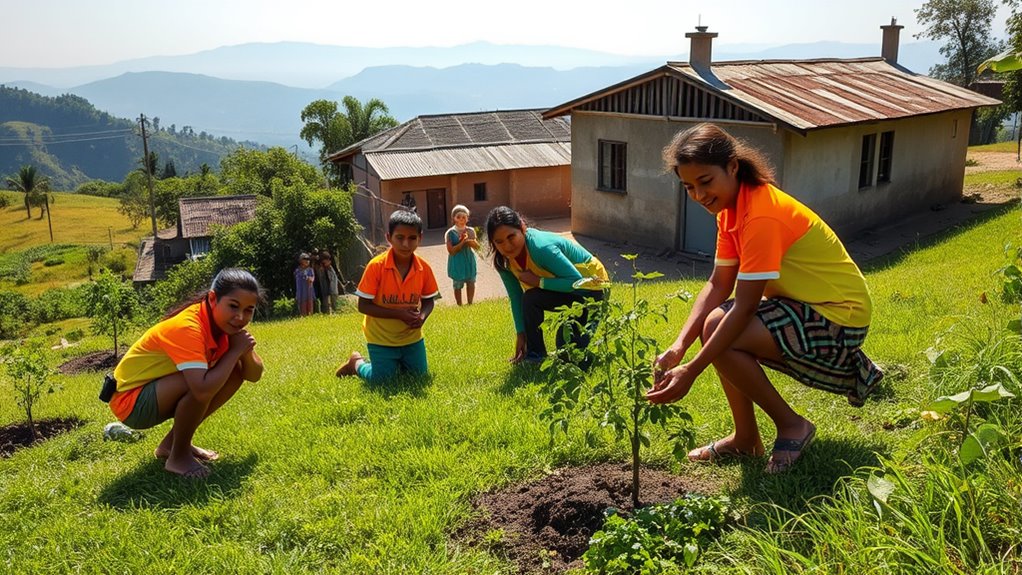
One of the most pressing concerns with volunteer tourism is the risk of creating dependency rather than fostering sustainable development. Dependency concerns arise when local communities rely heavily on volunteers or external aid, which can undermine their ability to develop independently. This reliance may lead to a cycle where volunteers continually fill gaps instead of empowering locals to build lasting skills and infrastructure. Additionally, sustainability challenges emerge when projects are short-term or poorly planned, leaving communities without ongoing support. You might unintentionally hinder long-term growth if your efforts aren’t aligned with local needs or if they disrupt existing systems. To address these issues, it’s vital to prioritize capacity building, ensure projects are community-led, and focus on empowering locals for enduring, sustainable progress.
Authenticity and Impact of Volunteer Efforts
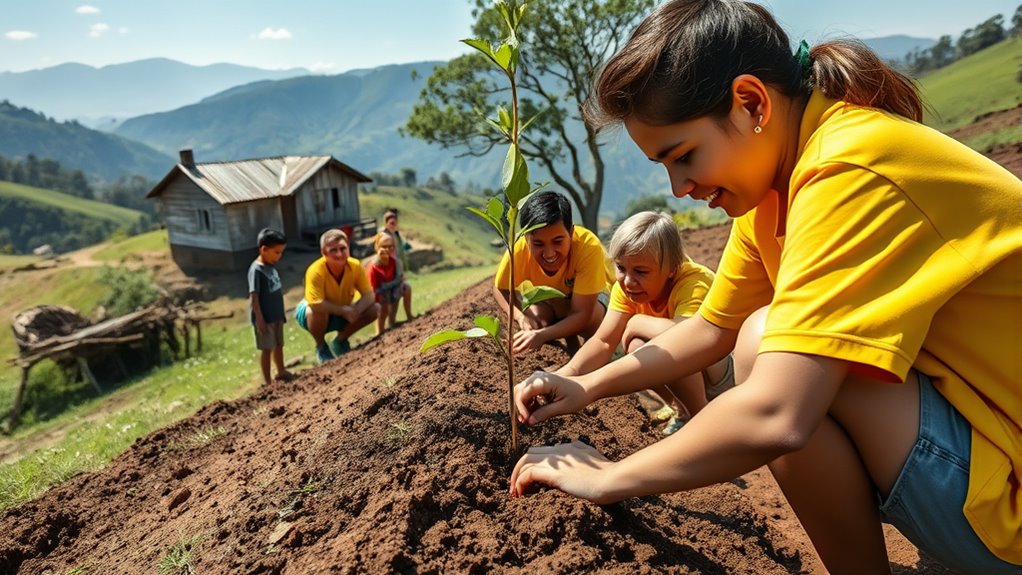
Volunteer tourism often claims to offer authentic cultural exchanges and meaningful contributions, but the true impact of these efforts can be uncertain. Your volunteer motivation may drive you to seek genuine experiences, yet sometimes projects prioritize short-term results over lasting change. Questions arise about whether your efforts truly benefit the local community or simply serve as a feel-good experience for volunteers. To assess authenticity and impact, consider:
- Are local voices involved in planning and decision-making?
- Does the project address long-term community needs?
- How are volunteer skills aligned with local priorities?
Recognizing these factors helps you understand whether your efforts foster authentic cultural understanding and meaningful impact or fall into superficial engagement. Ultimately, the true value of volunteer efforts depends on transparency and real community benefits.
Navigating Ethical Considerations in Voluntourism
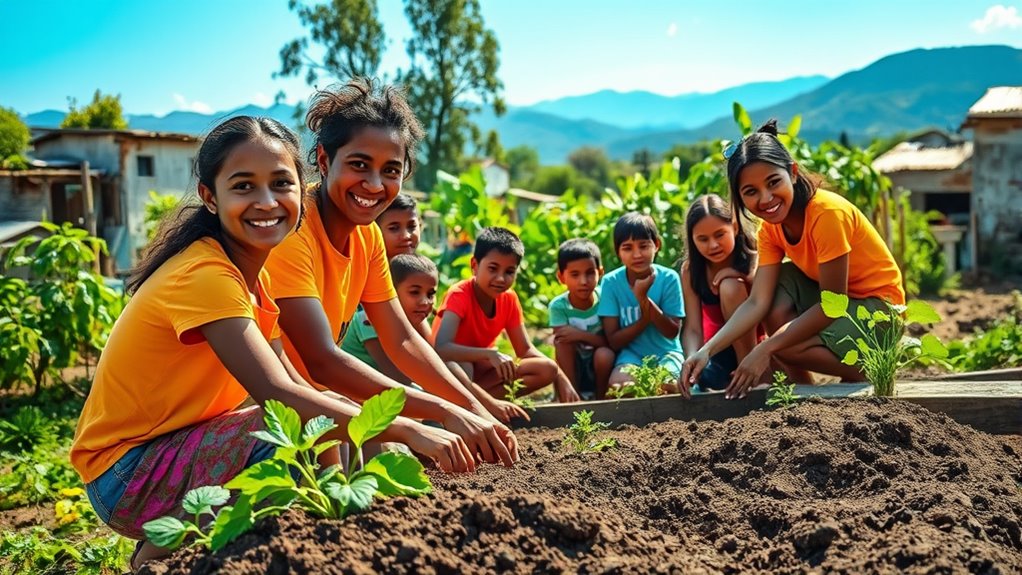
As a volunteer tourist, you need to prioritize cultural respect and sensitivity to avoid unintentionally causing harm. It’s also essential to contemplate how your efforts impact the community’s long-term sustainability. By staying mindful of these ethical considerations, you can ensure your involvement truly benefits the people you’re helping.
Cultural Respect and Sensitivity
Managing ethical considerations in voluntourism requires a deep understanding of cultural respect and sensitivity. Your role involves practicing respectful engagement and avoiding actions that could unintentionally offend or undermine local traditions. To do this effectively:
- Educate yourself about the community’s customs and social norms before arriving.
- Listen actively and ask permission when participating in local practices.
- Support local initiatives rather than imposing outside solutions.
Impact and Sustainability
Understanding the impact and sustainability of voluntourism is essential to guarantee that your efforts create lasting benefits rather than causing harm. You should consider how your activities influence ecological preservation and the environment’s health. Unsustainable projects can lead to environmental degradation, undermining the long-term viability of local ecosystems. To assure your contribution is positive, prioritize projects that focus on ecological preservation and community empowerment. Think about whether the initiative promotes lasting change or if it’s a temporary fix. By supporting organizations committed to sustainable practices, you help foster a balance between volunteer efforts and local needs. Ultimately, sustainable voluntourism guarantees that your involvement benefits both the community and the environment for years to come.
Making Informed and Responsible Choices as a Volunteer
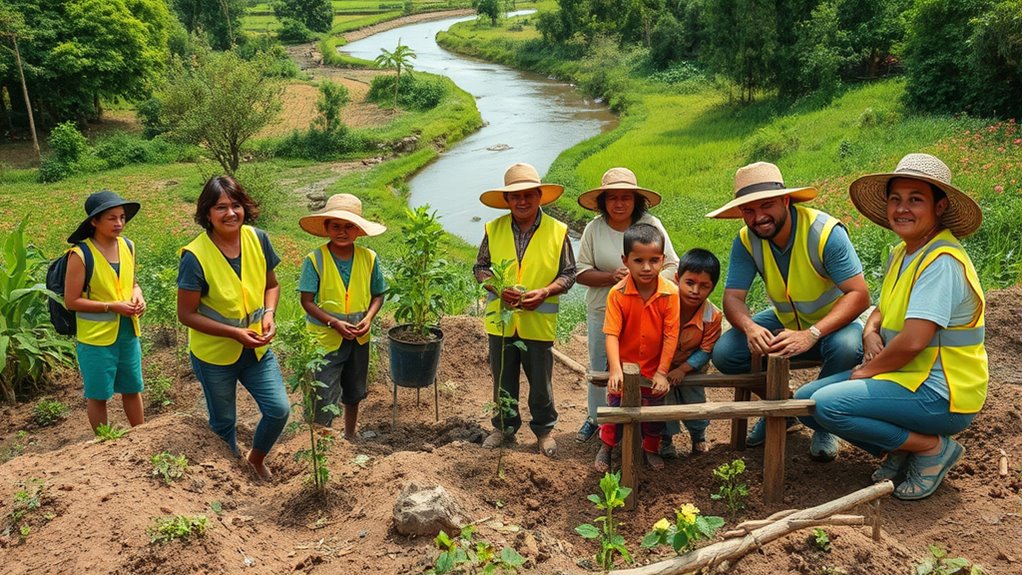
Making informed and responsible choices as a volunteer requires careful research and reflection before committing to a program. You need to contemplate potential ethical dilemmas, such as whether your presence might unintentionally harm local communities or disrupt existing systems. Be aware of volunteer burnout, which can affect your effectiveness and well-being if you overextend yourself. To make responsible decisions, you should:
Carefully research and reflect to ensure your volunteer efforts are ethical, effective, and sustainable.
- Research the organization’s mission, reputation, and impact
- Reflect on your skills and limits to avoid burnout
- Ensure your involvement aligns with local needs and priorities
Frequently Asked Questions
How Can Volunteers Ensure Their Efforts Are Genuinely Beneficial?
To guarantee your efforts are genuinely beneficial, you should focus on ethical considerations and measuring impact. Research the organization thoroughly to confirm it aligns with local needs and respects local communities. Stay engaged and ask for feedback to track progress. By prioritizing transparency and accountability, you help make sure your volunteer work truly supports sustainable development, avoiding well-meaning but ineffective or harmful practices.
What Are Effective Ways to Select Reputable Volunteer Organizations?
Think of choosing a volunteer organization like picking a safe harbor—you want one that’s trustworthy. To do this, prioritize organizations with strong ethical considerations and organizational transparency. Research their track record, read reviews, and verify their credentials. Ask questions about their impact and how they use donations. By doing so, you guarantee your efforts truly benefit communities and align with your values, making your volunteer experience meaningful and responsible.
How Does Volunteer Tourism Impact Local Economies Long-Term?
You might wonder how volunteer tourism influences local economies long-term. It can promote economic development by creating jobs and attracting visitors, boosting local businesses. However, it also has the potential to undermine community empowerment if benefits don’t reach residents directly. When done responsibly, volunteer tourism fosters sustainable growth and strengthens community ties, ensuring that the economic gains are lasting and genuinely support the community’s development and resilience over time.
Are There Specific Skills Needed to Participate in Volunteer Projects?
Think of volunteer projects like a puzzle—some skills fit perfectly, others need extra pieces. You don’t always need specialized skills, but basic training can boost your effectiveness. Skill requirements vary; for example, teaching or healthcare may need specific training, while community support often doesn’t. So, before joining, check training needs to make sure you’re prepared. With the right skills or willingness to learn, you can make a meaningful impact.
How Can Volunteers Avoid Unintentionally Causing Cultural Insensitivity?
To avoid unintentional cultural insensitivity, you should prioritize cultural awareness and respectful engagement. Learn about local customs, traditions, and social norms before volunteering. Listen actively, ask respectful questions, and observe how locals interact. Be humble, open-minded, and willing to adapt your behavior. Remember, showing genuine respect and understanding helps you build trust and creates positive, meaningful connections with the community you’re supporting.
Conclusion
As you consider volunteering abroad, remember that your choices shape lives and communities. Like a ripple in a pond, your actions can bring positive change or unintended harm. Stay informed, prioritize sustainability, and seek authentic opportunities. By doing so, you become not just a visitor, but a responsible guest whose impact echoes long after your journey ends. Embrace the power of mindful volunteering—because true change begins with your conscious decision to make a difference.









